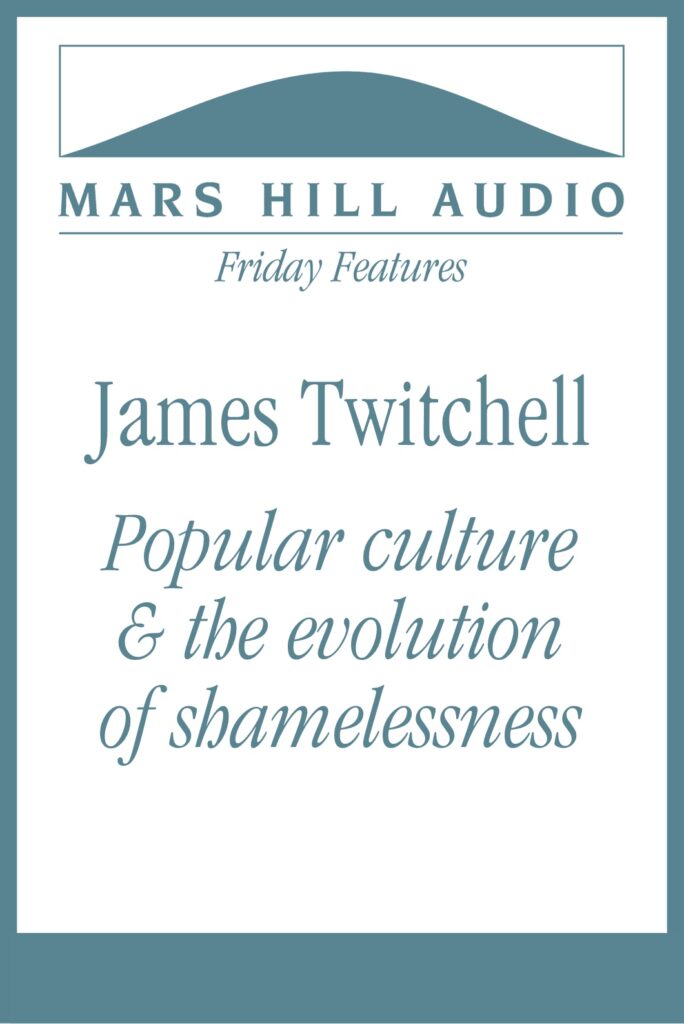
released 6/4/2021
In his 1997 book, For Shame: The Loss of Common Decency in American Culture, cultural critic James Twitchell surveyed the confusing state of the evolution of shame and shamelessness. On one hand, once stigmatized behavior was frequently celebrated and valorized; on the other, the power of public shaming in the media and online flame-wars was anticipating the rise of cancel culture. This interview with Twitchell about the book examines a few of the themes in For Shame.
20 minutes
PREVIEW
The player for the full version of this Feature is only available to current members. If you have an active membership, log in here. If you’d like to become a member — with access to all our audio programs — sign up here.
Related reading and listening
- The moral complicity of movie audiences — Film critic David Thomson explains why Alfred Hitchcock’s film Psycho achieves a kind of unique synergy with American culture, raising unsettling questions about alienation and identity. (33 minutes)
- Gratitude and stewardship as political postures —
FROM VOL. 118 Mark Mitchell explores the consequences of four concepts that are sadly missing from most political debates today: creatureliness, gratitude, human scale, and place. (18 minutes) - How advertising detaches us from the world —
FROM VOL. 13 Historian and cultural critic Jackson Lears discusses the power of advertising to reinforce and shape cultural attitudes about material goods. (9 minutes) - America as the Republic of Entertainment — Neal Gabler on the modern devotion to pleasure
- Defined by what we buy —
FROM VOL. 48 Gary Cross argues that Americans are uniquely susceptible to the temptation to define ourselves by what we buy. (10 minutes) - On Eugenics in America — Christine Rosen explores early eugenics support in the early 1900s and current “participatory evolution” practices. (50 minutes)
- Humans as biological hardware — In this essay, Brad Littlejohn and Clare Morell decry how modern technology tends to hack the human person in pursuit of profit. (55 minutes)
- Is American culture now story-less? — From our archives, Michael Kammen compares popular and mass culture, and Philip Fisher analyzes the idea that new cultural forms inevitably dissolve old ones. (26 minutes)
- Sports in America —
FROM VOL. 21 Robert Higgs looks at the history of sports in American experience and at how organized religion has interacted with that history. (12 minutes) - A theology of eating —
FROM VOL. 113 Theologian Norman Wirzba examines the relationship between food and faith. (24 minutes) - The unintended consequences of the Reformation —
FROM VOL. 114 Historian Brad Gregory discusses the unintended consequences of the Reformation, consequences which continue to trouble us. (26 minutes) - Infrastructures of addiction — Christopher Lasch on the subversive effects of the expectation of novelty
- Nihilism in popular culture —
FROM VOL. 44 Thomas Hibbs, author of Shows about Nothing, discusses the nihilism that runs through films and television shows in recent American popular culture. (9 minutes) - “I buy, therefore I am” — As counterpoint to the spirit of Black Friday, excerpts from the work of sociologist Craig Gay about the secularizing effects of modern economic habits are followed by an interview with Vincent Miller, author of Consuming Religion: Christian Faith and Practice in a Consumer Culture. (28 minutes)
- Our commerce, our selves — Thomas Frank argues that the anti-establishment ethos of the counterculture was not a new phenomenon in the 1960s but was already present in corporate America long before the Beatles showed up. (23 minutes)
- Desire desires desire — Zygmunt Bauman on being a consumer in a consumer society
- The cultural effects of advertising — Ted Prescott, Jackson Lears, Mark Crispin Miller, James Twitchell, and Pamela Walker Laird discuss how advertising affects personal and social life. (53 minutes)
- Loving your neighbor during a pandemic — Brad Littlejohn reflects on how best to ask and answer some of the questions raised by our current disease-ravaged circumstances, particularly questions related to Christian freedom and love of neighbor. (29 minutes)
- Sofa as church — David Thomson on the formative powers of television
- Mars Hill Audio Journal, Volume 100 — FEATURED GUESTS: Jennifer Burns, Christian Smith, Dallas Willard, Peter Kreeft, P. D. James, James Davison Hunter, Paul McHugh, Ted Prescott, Ed Knippers, Martha Bayles, Dominic Aquila, Gilbert Meilaender, Neil Postman, and Alan Jacobs
- Mars Hill Audio Journal, Volume 95 — FEATURED GUESTS: Stewart Davenport, William T. Cavanaugh, J. Matthew Bonzo, Michael R. Stevens, Craig Gay, Eugene Peterson, and Barry Hankins
- Mars Hill Audio Journal, Volume 78 — FEATURED GUESTS: Mark Bauerlein, Elisabeth Lasch-Quinn, Sam Van Eman, Thomas de Zengotita, Eugene McCarraher, and John Witte, Jr.
- The market-driven marriage? — The commodification of everything is a problem, not an opportunity.
- The Necessity of Tradition — “If a society wishes to find a way of ensuring that newly emergent and valuable techniques are passed on and preserved, its members must feel themselves under an ethical obligation to leave the best possible world not only for their children, but also for their grandchildren.”
- Mars Hill Audio Journal, Volume 68 — FEATURED GUESTS: Murray Milner, Jr., Steven C. Vryhof, Douglas J. Schuurman, Robert Gagnon, Richard Stivers, and Quentin Schultze
- Re-imagining economic obedience: lessons from Wendell Berry — The order of Creation, says Wendell Berry, is closer to that of a drama than that of a market. That quality should inform how we imagine economic life to be well-ordered.
- Mars Hill Audio Journal, Volume 48 — FEATURED GUESTS: Jon Butler, Gary Cross, Zygmunt Bauman, Pico Iyer, Richard Stivers, Larry Woiwode, Alan Jacobs, and James Trott
- Mars Hill Audio Journal, Volume 40 — FEATURED GUESTS: Joseph Epstein, John Gray, Kenneth R. Craycraft, Jr., William T. Pizzi, Pamela Walker Laird, Albert Borgmann, Neal Stephenson, and Alan Jacobs